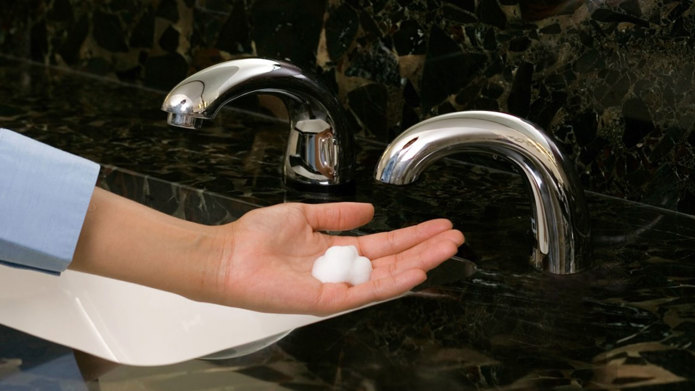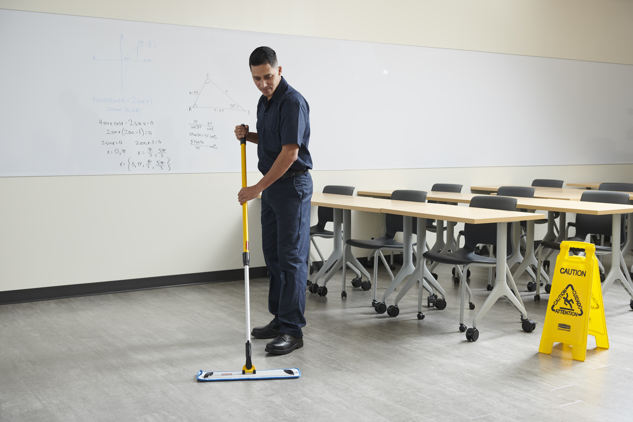
Even with routine cleaning and regular sanitisation in place, no childcare facility is perfect at all times. While things like hand hygiene and disinfecting are vital to keeping daycares safe, it’s likely that germs will make their way into the facility at one point or another.
Here we’ll take a look at what childcare providers can do to prevent infection and what necessary steps help manage the spread if an outbreak does occur.
There are a number of reasons childcare settings like preschools and daycares are more vulnerable to the spread of infectious diseases. A few factors that make communicable disease spread faster include:
Close-contact settings. Childcare centres are typically indoor settings where many children play, eat, nap and do other activities alongside one another. With multiple young ones in a class together for hours, each disease and infection can spread quicker and more easily from person to person.
Lower immunity. Little children also have less developed immune systems compared to teens and adults. Because of this, they are more likely to get sick since their bodies are less protected when exposed to certain germs and illness. This is especially true for first-time exposures.
Personal care. Toddlers and young children are more likely to have less-than-ideal personal care habits. They may not wash hands properly, touch dirty surfaces or share personal items with one another. Daycare-aged kids also tend to touch their eyes, noses, ears and mouths, making them more susceptible to germs.

Childcare centres face a higher risk of exposure to illness simply because many children share the same space, surfaces, and toys. While outbreaks can happen fast, strong daily routines can lower the risk from the start. The practices below are designed to support infection control in childcare settings, preventing the spread of germs and protecting everyone in your care.
Use soap and water or hand sanitiser before meals, after using the toilet, after outdoor play, and after handling bodily substances like blood or mucus. For younger children, alcohol-free foam hand rubs are a practical option when used under supervision.
Good hand hygiene is one of the simplest and most effective ways to reduce the spread of infection in child care settings. It helps protect children’s health, particularly those with developing immune systems, and lowers the risk of exposing staff and families to illness.
Tip: Place visual reminders near sinks and in bathrooms to encourage better hygiene. You can also include hand washing in staff training to reinforce consistent practices across all care services. This supports safer daily routines and helps maintain a healthier environment for everyone on site.
Daily cleaning is essential in high-traffic areas such as playrooms, bathrooms, and shared eating spaces. Mop floors and vacuum carpets after each session, paying extra attention to spots where children eat, sleep, or interact with one another.
Use colour-coded cleaning tools to prevent cross-contamination between areas. This system helps staff quickly identify the right mop, cloth, or bucket for each zone and reduces the risk of spreading germs from toilets to food prep areas.
Example: Use blue mops for general cleaning, red for toilets, and green for food preparation—these align with hygiene practices supported by the National Quality Framework.
A structured cleaning routine also improves safety and accountability, making it easier to train staff and conduct regular assessments across long day care, family day care, and other care services.
Shared toys, books, and learning tools can quickly spread germs between children, especially during outbreaks of respiratory syncytial virus (RSV), sore throat, or gastro. Regular disinfection is vital in managing infection across age groups and helps keep child care facilities safer for both children and staff.
All high-touch items should be cleaned daily or more frequently during periods of illness. HYGEN™ microfibre pads are ideal for this task—they remove 99.9% of microbes using only water and are safe to wash up to 500 times. For quicker turnarounds or added protection, use disposable microfibre cloths to clean hard plastic toys, furniture, and activity surfaces.
Action step: Set up toy rotation bins to separate used toys from clean ones. Allow time for disinfected items to air-dry fully before placing them back in play areas. This practice supports children’s health and helps child care workers deliver consistent infection control throughout the day.
Food preparation and eating areas require strict hygiene protocols to prevent infections from spreading through contact or shared items. These zones should always be kept clean, clutter-free, and separate from nappy change areas, bathrooms, or play zones.
Wipe down kitchen benches, tables, high chairs, and lunch trolleys using cloths dedicated only to food-related surfaces. Colour-coded cleaning cloths help avoid cross-contamination between food areas and other parts of the facility. It’s also good practice to clean these surfaces before and after each meal.
Don’t allow children to share food or drinks. This simple rule can significantly reduce the risk of spreading illness—especially in younger children who may not yet understand personal boundaries.
Did you know? Germs like norovirus and influenza can survive for hours on common surfaces such as countertops, plates, and tables. Disinfect food contact surfaces after every meal to help child care workers protect children’s health across all care services and age groups.
Using outdated or shared equipment that spreads dirty water across surfaces can increase the risk of infection. Upgrading to mop systems designed for infection control supports safer routines for all care services.
Mop systems like the HYGEN™ Pulse Mop help limit cross-contamination, as they feature an onboard solution reservoir that eliminates the need to dip into a bucket. This design avoids reusing dirty water, keeping floors cleaner and reducing germ spread. For larger child care centres, WaveBrake® mop buckets are ideal. They come with built-in dirty water compartments that separate clean and used water—reducing splashing and minimising exposure to body substances or contaminants.
Quick win: Switch to a bucket-less mop or a system with a dedicated dirty water chamber. It’s a small change that supports effective infection prevention and protects children and staff across long day care, family day care, and other education and care services.
In both long day care and family day care, each child’s items—such as water bottles, bedding, hats, and nappies—should be clearly labelled and stored separately to reduce the risk of cross-contamination. Items stored together or accidentally shared can quickly spread germs between individual children, especially during an outbreak.
Linen should be washed at least weekly, and more often when there is an increase in illness or confirmed cases of a communicable disease. Store each child’s bedding in separate containers or sealed bags to prevent germs from spreading to other children’s health gear.
Reminder: Children should not share personal items, particularly during a period of illness. Keeping these items separate is a simple step that supports public health guidelines and makes daily hygiene routines easier for childcare workers to manage across all age groups.
One of the most effective ways to prevent the spread of infectious diseases in child care settings is to reduce exposure at the source. Children and staff who show signs of illness—such as fever, cough, vomiting, diarrhoea, or sore throat—should remain at home until they have been symptom-free for at least 24 hours. This helps limit the chance of spreading germs to other children, educators, and the wider community.
Each state or territory may have specific health advice, so child care facilities should refer to public health authorities in South Australia, New South Wales, or their local jurisdiction for guidance. These recommendations often vary depending on the disease or outbreak type.
Communicate clearly: Keep families informed with regular updates, clear policies, and practical fact sheets. Education and care services play an important role in keeping families informed, supporting children’s health, and helping all age groups stay healthy during peak illness periods.
Even with the best cleaning systems in place, illness can still enter daycare facilities eventually. In many cases, infection starts at home with a child and spreads to others before symptoms appear. While infection prevention is the first line of defence, it’s just as important for daycare managers and employees to know the proper steps to take to minimise and control spread.
The following actions can help child care workers reduce the impact of an outbreak and protect other children in the centre.
When a child or staff member exhibits symptoms of illness, prompt action is crucial. Isolate the individual straight away to reduce the risk of contact with others. If a child is sent to childcare and begins to show signs of illness or infection, the first step is to isolate them as soon as possible. This may involve relocating them to an office or a designated health space until they can be collected.
Respiratory illnesses, gastrointestinal infections, and viruses like RSV spread quickly through air, body substances, and shared surfaces. Long day care and family day care centres should also contact families to inform them of any confirmed cases of illness.
The National Health and Medical Research Council (NHMRC) strongly recommends keeping sick children at home until all symptoms are gone. This helps protect children’s health across all age groups and supports effective infection prevention in child care facilities.
Staff should focus on high-contact areas like toys, nap mats, door handles, toilets, and shared equipment. Frequent sanitising during this stage is critical to managing infection and limiting exposure to other children and staff.
Use disposable microfibre cloths for wiping down surfaces in food prep areas, bathrooms, and play zones. HYGEN™ Microfibre Mops and Cloths are ideal for sanitising floors and soft areas, such as rest mats. Both the disposable and launderable ranges are designed for childcare environments, supporting safe cleaning without the spread of germs.
Education and care services should have outbreak cleaning protocols in place and make training part of staff induction. This promotes safety and consistency across all care services. Cleaning should continue daily until the outbreak subsides.
Increase hand washing if infection has potentially begun to spread. Staff should also supervise younger and older children during washing times to make sure hands are being cleaned thoroughly—especially before meals and after toileting. Covering coughs and sneezes should also be part of this routine.
Use liquid soap and water whenever possible, and place alcohol-free hand rub in rooms where sinks are not available. These steps help reduce the spread of germs between contact points, surfaces, and individuals.
Effective infection prevention depends on habits, not just products. Personal items such as dummies, bottles, or comfort toys should not be shared between individual children.
Watch for common signs of infectious disease, such as fever, cough, sore throat, fatigue, or changes in behaviour—especially in younger age groups who may not be able to communicate how they feel.
If symptoms develop, follow the same isolation and contact procedures. Immediate communication with parents is strongly recommended. Families should be informed of the situation with accurate advice from public health authorities.

Keeping child care facilities clean and hygienic is not just about meeting compliance—it’s about protecting children’s health every day. Rubbermaid Commercial provides cleaning solutions that support the rigorous cleaning routines required by early learning centres, long day care, and family day care services across Australia.
Our range includes colour-coded mop systems, microfibre cloths, Pulse Mops, and WaveBrake® mop buckets that are designed to support daily routines, outbreak response, and broader infection control strategies. These tools help child care workers clean faster, reduce cross-contamination, and maintain safer spaces for all age groups.
From food prep areas to shared play zones and restrooms, every surface in a child care environment needs careful attention. That’s why we supply full cleaning systems—tools that work together to support consistent cleaning schedules and improve safety across all care services.
Combine our high-quality cleaning equipment, disinfectant tools, and training support to strengthen your centre’s infection control practices. Contact our team today to learn more about how we help education and care services keep their environments clean, compliant, and ready for anything.